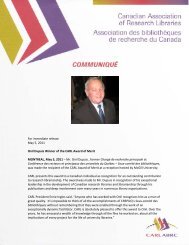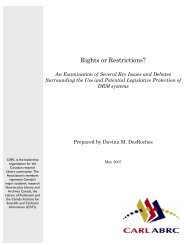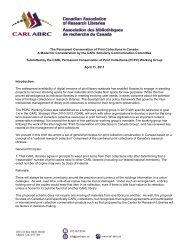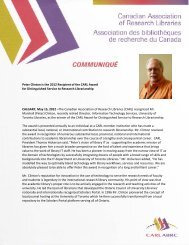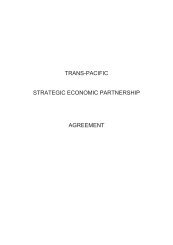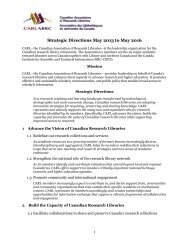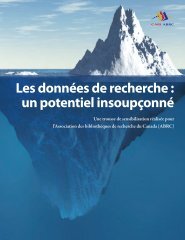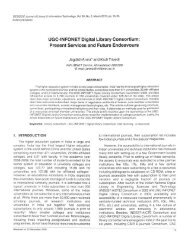PDF - CARL - ABRC
PDF - CARL - ABRC
PDF - CARL - ABRC
You also want an ePaper? Increase the reach of your titles
YUMPU automatically turns print PDFs into web optimized ePapers that Google loves.
Appendices<br />
Recommendations<br />
I. Collecting Carefully, with Regard to Costs, and Ethical and Legal Concerns<br />
Special Collections in ARL Libraries<br />
March 2009<br />
1. Donors and senior administrators need to be informed about the value and the costs of managing collections.<br />
Repositories need carefully to assess their own capabilities prior to accepting collections. Tools should be<br />
developed to assist in this process of assessment.<br />
2. The professionals and administrators who are charged with care of special collections must themselves take<br />
carefully into account the costs of preservation, processing and providing access, including digital access, when<br />
they accept or purchase a collection.<br />
3. The heads of archives and libraries, as well as their special collections staff, must educate donors to the<br />
consequences of lengthy restrictions on access, and should strive to balance considerations of individual privacy<br />
with those of scholarly access and the long-term interests of collections and their users.<br />
4. Rigorous, full, and accurate documentation of the source of any acquisition is essential.<br />
5. Archivists, curators, and librarians must support the work of records management staff and adopt early<br />
intervention practices in order to facilitate collecting, describing, and preserving new types of special collections,<br />
particularly those born-digital<br />
II. Ensuring Discovery and Access<br />
6. Special collections professionals should take a lead in researching and developing new forms of access, and<br />
finding opportunities to apply them to special collections. Libraries and other repositories need to make the<br />
necessary investment in technology to advance the creation of tools, and support their staff in taking this lead.<br />
7. Adequate online metadata is an essential condition for good quality access to both the original and digitized<br />
versions of material. Minimal description is far better than none. Basic information about all collections (e.g., the<br />
initial record of acquisition) should be made available online as quickly as possible.<br />
www.arl.org/bm~doc/scwg-report.pdf Page 33



